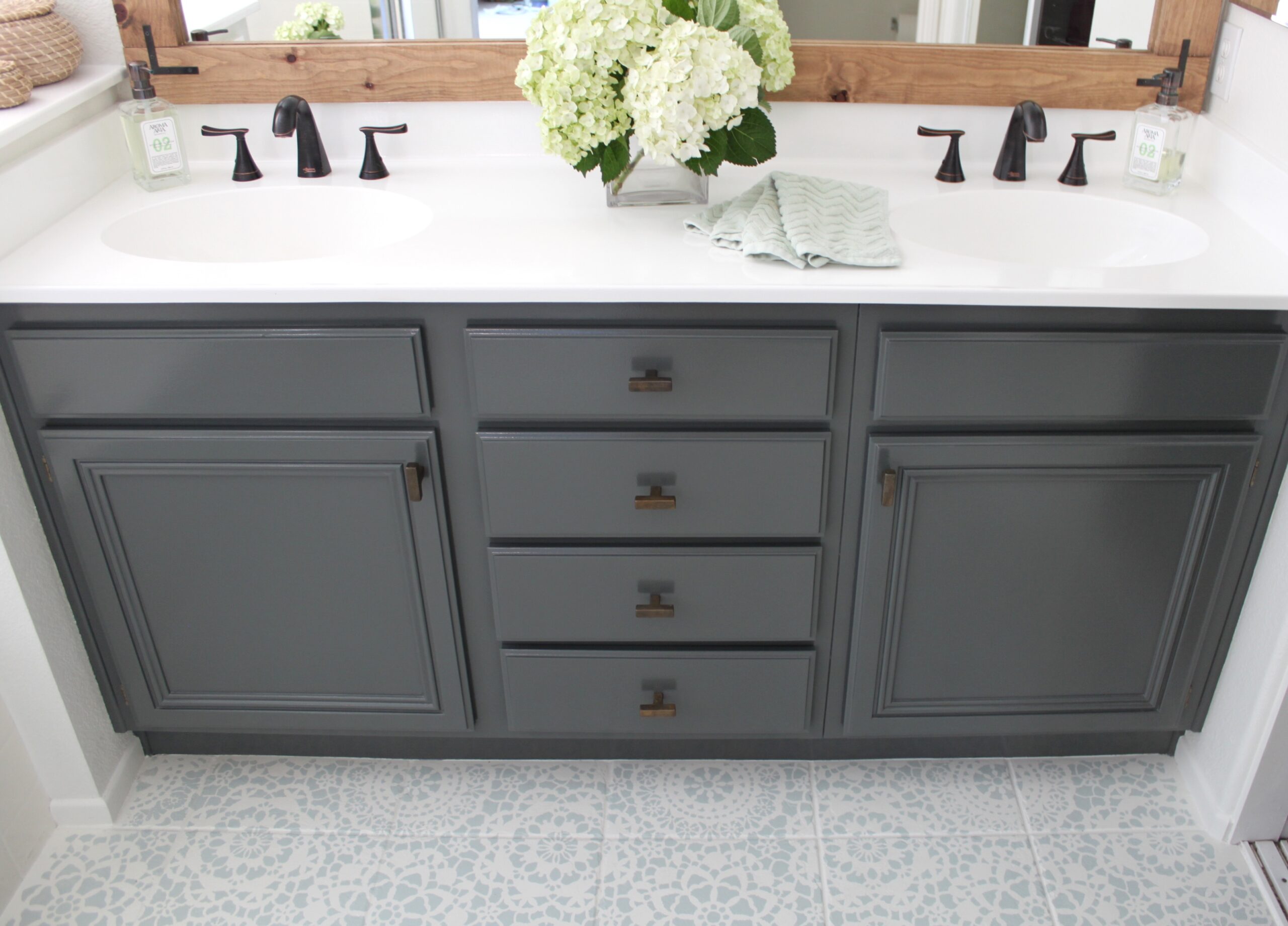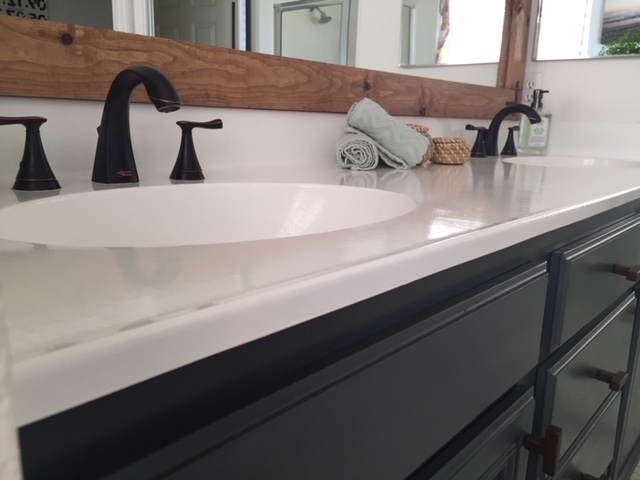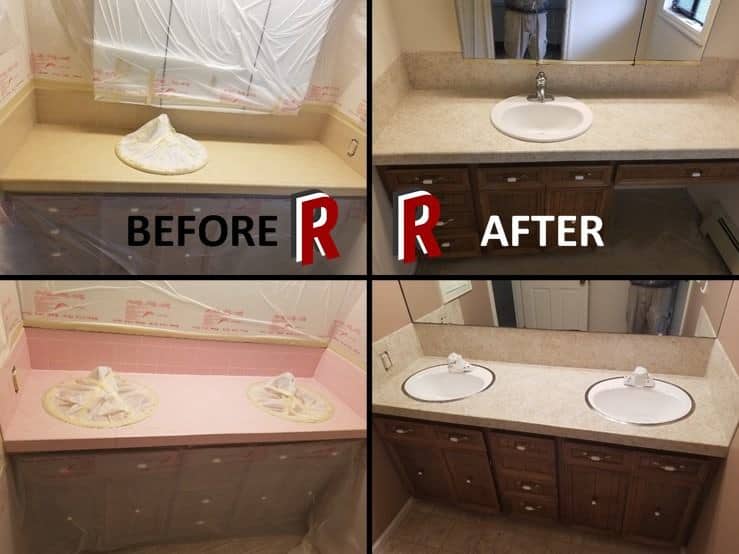Refinishing bathroom countertops is a cost-effective and efficient way to update the look of your bathroom without undergoing a full renovation. Whether you’re looking to modernize outdated countertops or simply refresh the existing ones, refinishing offers a variety of benefits. Here’s a comprehensive look at the process, benefits, materials, and FAQs related to refinishing bathroom countertops.
Process of Refinishing Bathroom Countertops:
Refinishing bathroom countertops typically involves several steps. First, the existing countertop surface is thoroughly cleaned and prepared to ensure proper adhesion of the new finish. Any chips, cracks, or imperfections are repaired using a filler material. Next, a primer is applied to create a smooth and durable base for the new finish. Finally, multiple coats of a specialized countertop refinishing product are applied to achieve the desired look. This process can usually be completed in a day or two, depending on the extent of the refinishing.
Benefits of Refinishing Bathroom Countertops:
- Cost-Effective: Refinishing is much more affordable than replacing the entire countertop, making it a budget-friendly option for homeowners.
- Time-Saving: Unlike a full countertop replacement, which can take days or weeks to complete, refinishing can typically be done in a fraction of the time.
- Variety of Finishes: Refinishing products come in a variety of colors and finishes, allowing homeowners to customize their countertops to suit their style preferences.
- Eco-Friendly: Refinishing reduces waste by reusing existing countertop materials, making it a more environmentally friendly option compared to replacement.
- Durability: High-quality refinishing products provide a durable and long-lasting finish that can withstand daily use in the bathroom.

Materials Needed for Refinishing:
- Cleaner and Degreaser: Used to clean the existing countertop surface and remove any dirt, grime, or grease.
- Filler Material: Used to repair any chips, cracks, or imperfections in the countertop surface.
- Primer: Creates a smooth and durable base for the new finish to adhere to.
- Refinishing Product: Specialized coatings designed specifically for refinishing countertops, available in various colors and finishes.
- Sandpaper or Sanding Block: Used to lightly sand the countertop surface to promote adhesion of the primer and refinishing product.
Types of Countertops Suitable for Refinishing:
- Laminate: Laminate countertops are a popular choice for refinishing due to their affordability and versatility.
- Tile: Tile countertops can also be refinished, providing a cost-effective way to update the look of a tiled countertop without replacing the tiles.
- Solid Surface: Solid surface countertops, such as Corian or acrylic, can be refinished to repair minor damage or update the color.
- Cultured Marble: Cultured marble countertops can be refinished to repair scratches, chips, or stains and restore their original appearance.

Maintenance and Care:
Once the countertop refinishing is complete, proper maintenance is essential to ensure its longevity. Avoid using abrasive cleaners or harsh chemicals that can damage the finish. Instead, use mild soap and water for regular cleaning. It’s also important to use cutting boards and trivets to protect the surface from scratches and heat damage. With proper care, a refinished bathroom countertop can maintain its beauty for years to come.
Cost of Refinishing vs. Replacement:
The cost of refinishing bathroom countertops is significantly lower than the cost of replacing them entirely. While the exact cost can vary depending on factors such as the size of the countertop, the condition of the existing surface, and the chosen refinishing products, refinishing typically costs a fraction of the price of replacement. This makes it a popular choice for homeowners looking to update their bathroom on a budget.
DIY vs. Professional Refinishing:
While some homeowners may choose to refinish their bathroom countertops themselves as a DIY project, hiring a professional refinishing company can ensure a high-quality finish and reduce the risk of errors or mistakes. Professional refinishing companies have the expertise and specialized equipment needed to properly prepare the surface, apply the refinishing products, and achieve a smooth and durable finish. Additionally, hiring a professional can save time and hassle for homeowners who may not have the necessary skills or experience to tackle the project themselves.
Factors to Consider Before Refinishing:
Before refinishing your bathroom countertops, there are several factors to consider. First, assess the condition of the existing countertop surface to determine if refinishing is a viable option. If the countertop is severely damaged or in poor condition, replacement may be necessary. Additionally, consider your budget and timeline for the project, as well as your desired outcome in terms of color and finish. Finally, research and choose a reputable refinishing company or gather the necessary materials and tools if opting for a DIY approach.

Popular Finishes and Colors:
Refinishing products for bathroom countertops come in a wide range of finishes and colors to suit various design preferences. Popular finishes include matte, satin, and high-gloss, each offering a different level of shine and sheen. Common color options include white, gray, beige, and black, as well as more vibrant colors for homeowners looking to make a bold statement in their bathroom. Some refinishing products even mimic the look of natural stone or granite for a luxurious appearance at a fraction of the cost.
Potential Drawbacks and Considerations:
While refinishing bathroom countertops offers many benefits, there are some potential drawbacks and considerations to keep in mind. First, refinishing is not suitable for all types of countertops, especially those with extensive damage or structural issues. Additionally, the quality of the refinishing job can vary depending on factors such as the skill level of the applicator and the quality of the refinishing products used. Finally, while refinishing can provide a fresh new look, it may not completely disguise underlying imperfections or damage in the existing countertop surface.
Long-Term Durability:
With proper care and maintenance, a refinished bathroom countertop can provide long-term durability and performance. High-quality refinishing products are designed to withstand daily use in the bathroom, including exposure to moisture, heat, and cleaning chemicals. However, it’s important to follow the manufacturer’s guidelines for care and maintenance to ensure the longevity of the finish. Regular cleaning and avoiding abrasive cleaners and harsh chemicals can help preserve the appearance of the refinished countertop for years to come.
Environmental Impact:
Refinishing bathroom countertops can have a positive environmental impact compared to replacing them entirely. By reusing existing countertop materials and avoiding the need for new materials, refinishing reduces waste and conserves natural resources. Additionally, refinishing products are often low in volatile organic compounds (VOCs), reducing emissions and indoor air pollution. For eco-conscious homeowners looking to reduce their carbon footprint, refinishing is a sustainable option for updating their bathroom countertops.

Popular Refinishing Techniques:
There are several popular techniques used in refinishing bathroom countertops to achieve different looks and textures. One common technique is faux finishing, which involves using specialized paints and tools to mimic the appearance of natural stone or other materials. Another popular technique is epoxy coating, which provides a durable and high-gloss finish that can be customized with different colors and additives. Additionally, some homeowners opt for concrete overlay, which involves applying a thin layer of concrete over the existing countertop surface for a modern and industrial look.
Precautions During the Refinishing Process:
During the refinishing process, it’s important to take certain precautions to ensure a safe and successful outcome. Ventilation is crucial to minimize exposure to fumes from the refinishing products, so be sure to open windows and use fans to promote airflow. Additionally, wear protective gear such as gloves, goggles, and a respirator to protect against chemical exposure. Follow the manufacturer’s instructions for proper application and drying times, and avoid using the bathroom until the refinishing products have fully cured to prevent damage to the finish.
Potential Return on Investment:
Refinishing bathroom countertops can provide a positive return on investment (ROI) by enhancing the appearance and value of your home. While the exact ROI can vary depending on factors such as the quality of the refinishing job and the local real estate market, updating the bathroom with a fresh and modern countertop can appeal to potential buyers and increase the overall appeal of the space. Additionally, refinishing is a cost-effective way to refresh the bathroom without investing in a full renovation, making it an attractive option for homeowners looking to maximize their ROI.

How long does it take to refinish bathroom countertops?
The time it takes to refinish bathroom countertops can vary depending on factors such as the size of the countertop, the extent of the refinishing needed, and the specific products used. In general, the process can typically be completed within a day or two, making it a relatively quick and convenient option compared to a full countertop replacement.
Can all types of countertops be refinished?
While many types of countertops can be refinished, it’s important to assess the condition of the existing surface to determine if refinishing is a viable option. Laminate, tile, solid surface, and cultured marble countertops are commonly refinished, but countertops with extensive damage or structural issues may require replacement instead.
How much does it cost to refinish bathroom countertops?
The cost of refinishing bathroom countertops can vary depending on factors such as the size of the countertop, the condition of the existing surface, and the chosen refinishing products. On average, homeowners can expect to pay a fraction of the cost of replacement, making refinishing a budget-friendly option for updating the bathroom.
How long does a refinished bathroom countertop last?
With proper care and maintenance, a refinished bathroom countertop can last for many years. High-quality refinishing products are designed to withstand daily use in the bathroom, including exposure to moisture, heat, and cleaning chemicals. Regular cleaning and avoiding abrasive cleaners can help preserve the appearance of the refinished countertop over time.
Is it better to hire a professional or do it yourself when refinishing bathroom countertops?
While some homeowners may choose to refinish their bathroom countertops themselves as a DIY project, hiring a professional refinishing company can ensure a high-quality finish and reduce the risk of errors or mistakes. Professional refinishing companies have the expertise and specialized equipment needed to properly prepare the surface, apply the refinishing products, and achieve a smooth and durable finish, making it a convenient option for homeowners.

Countertop Refinishing – Refinish your CounterTops

Bathroom Countertop RedRock Resurfacing

Pin on Countertop Refinishing

Related articles: